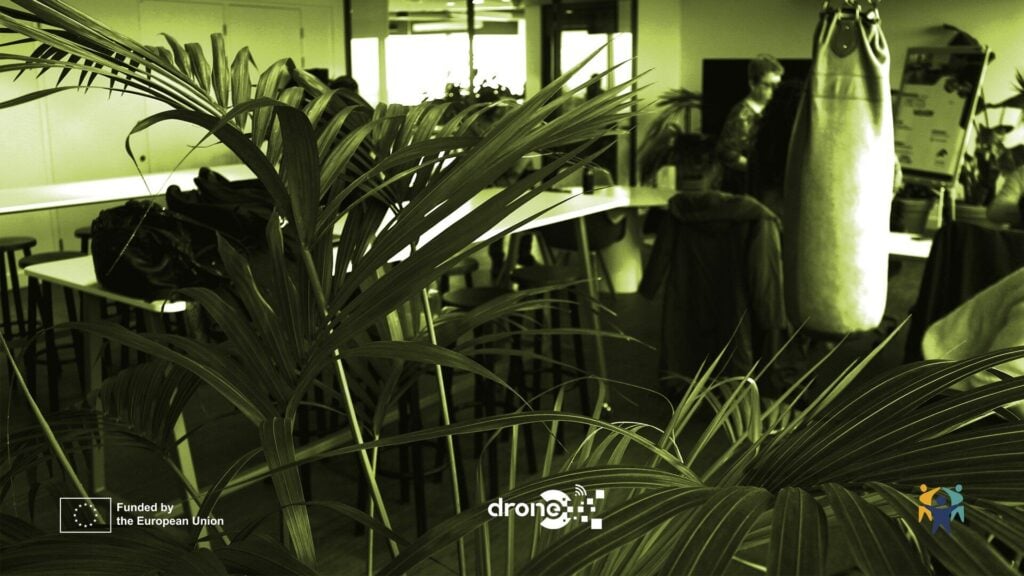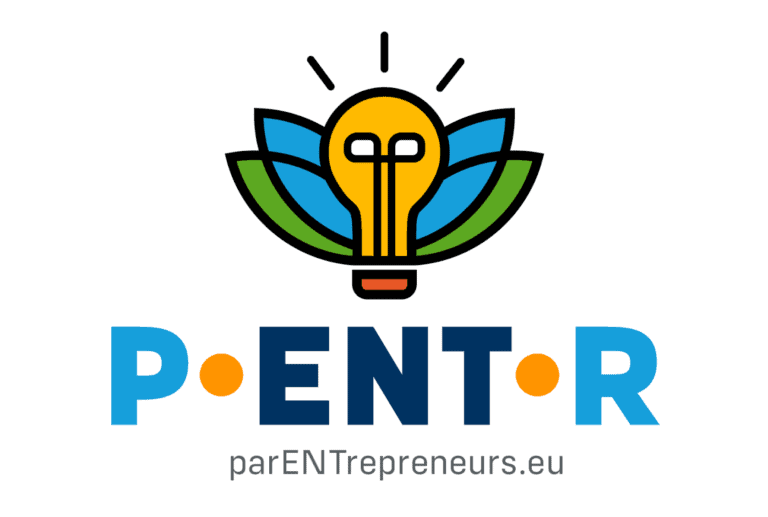DRONE’s Validation Workshop: Digital Literacy in action

In this Article
A great team for a great workshop
It’s the 6th of November. I’ve just landed at the busy-as-usual Schiphol airport and I’m heading towards the Farm Kitchen in Hoofddorp to take part in Project DRONE’s handbook validation workshop. As the lift reaches the 19th floor, appropriately called “Lighthouse”, my gaze stretches across the outer rim of the city, surrounded by the green Dutch countryside that will soon be engulfed in the thick fogs of autumn. “One of those four-seasons-in-a-day days,” quips our director, Eszter Salamon.
We are soon joined by our colleagues from all over Europe. It’s not your usual meeting in which people sit quietly, waiting for their turn to speak. This is a workshop in the style of Parents International: engaging, hands-on, and experiential. It’s designed to be inclusive in the purest sense of the word: we are a parent organisation, and one of our team members is breastfeeding. Far from being a complication, having a toddler in the room is a sweet reminder of the principles we embrace and the objectives we pursue.
Having such a great team and capable facilitators means that I can even sneak out for a short time to speak at the webinar Digital Citizenship Education in Practice: Well-being Online and the Voice of Young People hosted by the Council of Europe and the digi.well project as part of the European Year of Digital Citizenship Education 2025.
Over the course of two days, we analysed the guides thoroughly from multiple perspectives. We discussed content, tone, design, and we even deployed role-play techniques to brainstorm ideas and identify areas of improvement.
But, you might ask, what are these guides, and what is DRONE?
The DRONE Project
Project DRONE is an Erasmus+ research and innovation project that puts digital literacy and disinformation resilience at the heart of European education. Its full title says it all: Teacher and school leaders training to promote Digital liteRacy and combat the spread of disinfOrmation among vulNerable groups of adolEscents.
It runs across several European countries and brings together universities, school leadership organisations and parent associations with one goal: equip schools with practical, research-based tools to help young people think critically about what they see online, recognise fake news, and navigate AI-powered platforms safely.
To meet this ambitious goal, DRONE:
- maps gaps in current practice,
- conducts large-scale field research with students, teachers, school leaders and parents.
- develops and pilots training programmes, handbooks and an e-learning platform for professional educators, as well as resources tailored to families and policy-makers.
The project works on three interconnected levels:
- the disinformation ecosystem (how false information spreads and influences choices)
- the human development ecosystem (building students’ and adults’ critical thinking and resilience)
- the whole-school ecosystem, with special attention to vulnerable groups of adolescents.
The guides
The guides and manuals we are validating in this workshop are one of the project’s key outputs. They are designed to turn robust evidence into concrete support for classrooms, school leadership and families.
Parents
The DRONE Parents Handbook is a practical guide for parents and carers who want to feel more confident about their children’s digital lives – without needing to be tech experts. Developed from DRONE’s research with students, families and schools, it starts from a simple idea: parents are not just “gatekeepers,” but mentors, role models and partners in learning.
The handbook walks you step by step through the key building blocks of digital literacy and disinformation from a family perspective. Early chapters explain information literacy and the differences between misinformation, disinformation and “fake news,” using clear examples, case studies and everyday situations (for instance, a relative sharing a dubious health tip or a teenager discovering a viral conspiracy video). Parents are given concrete questions, checklists and “family challenges” to help them practise fact-checking and source evaluation together with their children.
Central chapters focus on resilience, problem-solving and critical thinking in the digital age. They show how online life affects emotions, identity and relationships, and offer tools like the “Resilience Roadmap,” simple problem-solving frameworks (STOP – THINK – CHOOSE – CHECK, DEAR), conversation starters and coping strategies for when things go wrong. Real-life scenarios – exclusion from a group chat, viral challenges, hacked accounts – are used to guide parents through calm, constructive responses.
The handbook also tackles bullying and cyberbullying, cybersecurity and building alliances. It recognises that harm can come from peers, adults or family members, and suggests ways for parents to work with schools, community organisations and other carers. Practical annexes and policy templates help families and school leaders align expectations and create safer digital environments together.
School Leaders
The DRONE School Leaders Handbook is the second volume in the DRONE series, designed specifically for heads, principals and leadership teams who want to make digital literacy and disinformation a strategic whole-school priority – not just an add-on lesson.
Grounded in DRONE’s research, it starts from a clear message: school leaders are pivotal. Leadership attitudes and decisions shape whether digital literacy is embedded across curriculum, safeguarding and communication – or left to isolated, one-off activities. The opening sections translate “Key Messages from DRONE Research” into concrete leadership tasks: building coherent policies, supporting teachers, communicating transparently with parents, and constructing alliances with trusted partners.
The core of the handbook is organised into eight practical chapters: information literacy; disinformation, misinformation and fake news; resilience building; problem-solving; critical thinking; bullying and cyberbullying; cybersecurity; and building alliances. Each chapter explains why the topic matters for leaders, offers reflective questions (“self-check” tests), and then moves into highly practical tools: school-wide frameworks, ready-to-adapt procedures, case studies (“rumours in the community,” “the hacked account,” “the curriculum controversy”), and checklists leaders can use in staff meetings or strategic planning.
A substantial final section provides policy templates and frameworks – for example, a model cyberbullying policy, a digital literacy framework outline, and cybersecurity protocols – giving leaders a starting point they can tailor to their own school context and legal environment.
Teachers
The DRONE Teachers Handbook is the third volume in the series, created for teachers who are on the frontline of students’ digital lives and who need practical, classroom-ready support rather than abstract theory. It starts from DRONE’s key insight that students usually test new claims and viral content first in class – which makes teachers the first adults confronted with misinformation, online conflict and digital harm.
The handbook opens with research-based “Key Insights for Teachers” (teachers as role models, the need for continuous training, the emotional toll of digital pressure), then moves into eight core chapters: information literacy; disinformation, misinformation and fake news; resilience building; problem-solving in the digital world; critical thinking; bullying and cyberbullying; cybersecurity; and building alliances. Each chapter combines short explanation, self-reflection prompts, concrete classroom strategies, and rich case studies (for example: the “viral vaccine video” in biology, a rumour about a teacher, a fake health trend in PE, or the “flat Earth” debate in geography).
A distinctive feature of this volume is its strong lesson-plan toolkit: ready-made, adaptable activities on spotting fake news, building digital resilience, practising critical thinking online, and teaching cybersecurity basics. These come with clear objectives, timings, materials, step-by-step procedures and assessment ideas, so teachers can start using them immediately in primary or secondary classrooms. A final Teacher Quick Reference Guide distils key checklists and frameworks – from “Digital First Aid” steps to bullying warning signs, critical-thinking questions and alliance/e-safety checks – into a handy at-a-glance format.
Conclusions
Over the course of this workshop, we have discussed at length and analysed in depth the DRONE Handbooks. Their final versions are planned for release in multiple European languages by around March 2026, so that parents, teachers and school leaders across Europe can rely on a shared, research-based and highly practical resource to build digital literacy, resilience and safe, critical classrooms.
We are now looking forward to some high-intensity months, finalising the layout and developing effective, user-friendly illustrations. We will keep you posted – so stay tuned!
Emanuele Bertolani
More from Parents International
Erasmus+ DRONE Project: Advancing Digital Literacy and Combating Disinformation
Parents’ Perspectives on Digital Literacy, AI, and Better-prepared Teachers
Digital Citizenship Education: A Bold Step Toward a Smarter Future
Parents – inspiring protagonists of cyberbullying prevention


